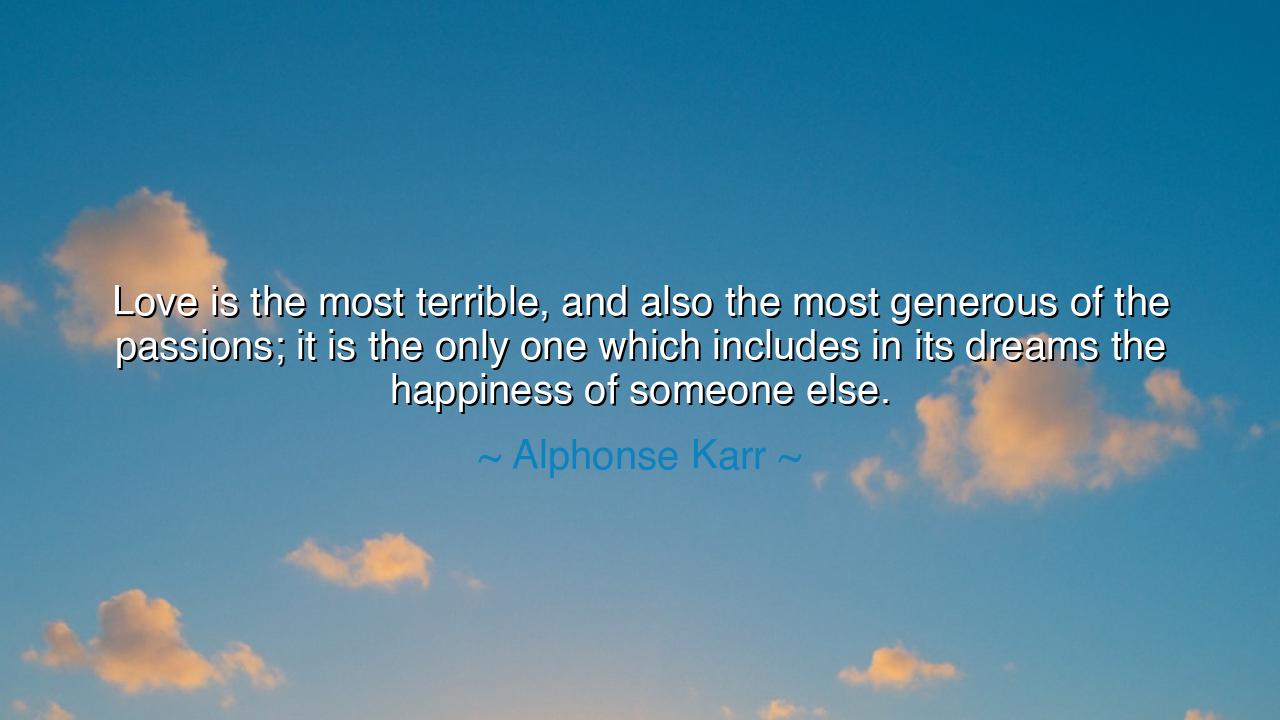
Love is the most terrible, and also the most generous of the
Love is the most terrible, and also the most generous of the passions; it is the only one which includes in its dreams the happiness of someone else.






“Love is the most terrible, and also the most generous of the passions; it is the only one which includes in its dreams the happiness of someone else.” Thus wrote Alphonse Karr, the French novelist and moralist, whose heart knew both the beauty and the anguish of human feeling. His words shimmer like sunlight upon a blade, for they speak of the double nature of love—that it is both terrible and generous, both wound and gift. In all the passions that stir the human spirit, love alone transcends the self; it alone hungers not only for its own delight, but for the happiness of another.
From the dawn of time, the poets and prophets have wrestled with this mystery. The warriors of Greece sang of it; the saints of Jerusalem wept for it. Love stands apart from all other passions, for it is both ecstasy and sacrifice. Ambition seeks power for oneself, greed seeks wealth, pride seeks recognition—but love seeks joy in another’s joy, and suffers in another’s pain. It is therefore the most terrible, for it makes one vulnerable; yet it is also the most divine, for it dissolves the walls that separate one soul from another.
In the time of Alphonse Karr, the world was awakening to both romantic passion and moral reflection. He saw that love’s power could lift men to the heavens or cast them into despair. He called it terrible because it consumes; it devours boundaries, shatters reason, and leaves the heart exposed. Yet he called it generous because, unlike lust or pride, it gives without measure. True love does not demand—it offers; it does not calculate—it surrenders. It is not content with its own happiness but dreams of another’s. This, Karr teaches, is what makes love holy among the passions.
The ancients told the story of Orpheus and Eurydice, a tale as old as sorrow itself. Orpheus, the musician whose songs could move the stones, descended into the underworld to bring back his beloved. His love was so pure that even Hades granted him passage—on one condition: he must not look back. But as they neared the light, his heart, trembling with longing, turned toward her, and she vanished forever. This story is the image of Karr’s wisdom: that love’s greatness lies in its generosity, in its willingness to risk everything for the sake of another’s joy, even to its own destruction. For love’s tragedy is that it cannot exist without vulnerability; to love is to open oneself to loss, yet to refuse love is to deny one’s own soul.
Love is terrible, too, because it changes the measure of the heart. Once touched by it, a person cannot remain small. The selfish man becomes generous; the proud becomes humble; the coward learns to face fire. Love reshapes the soul until the happiness of another becomes more precious than one’s own comfort. In this sense, Karr saw love as the highest form of human transcendence—it teaches the spirit to leave the narrow circle of the self and enter into communion with another being. It is not the easiest path, but it is the most exalted.
Consider the story of Florence Nightingale, who left a life of privilege to tend the wounded in war. Her love for humanity was no romantic passion, yet it burned with the same divine generosity that Karr described. She endured suffering, sleepless nights, and endless pain for the sake of others’ happiness. In her, love became not merely emotion, but sacrifice—a passion purified into compassion. This is what Karr meant: that love, in its highest form, is not possession but offering, not desire but devotion.
So, my children of the future, remember this: to love is to walk upon a blade of light. It will wound you and heal you, lift you and humble you. It demands courage greater than war and patience deeper than time. Yet it is the one passion that redeems all others, for it teaches the soul to dream beyond itself. Do not fear its terrors, for they are the signs of its truth; do not doubt its generosity, for it is the heartbeat of creation itself.
Therefore, when you love, love bravely. Seek not to own, but to honor. Let your dreams be large enough to contain the joy of another. For in that act, you will touch the eternal. And when the world asks what is the most terrible and the most beautiful of all passions, answer as Alphonse Karr did: it is love—the fire that burns and the light that blesses, the one passion whose dream is not the self, but the happiness of someone else.






AAdministratorAdministrator
Welcome, honored guests. Please leave a comment, we will respond soon